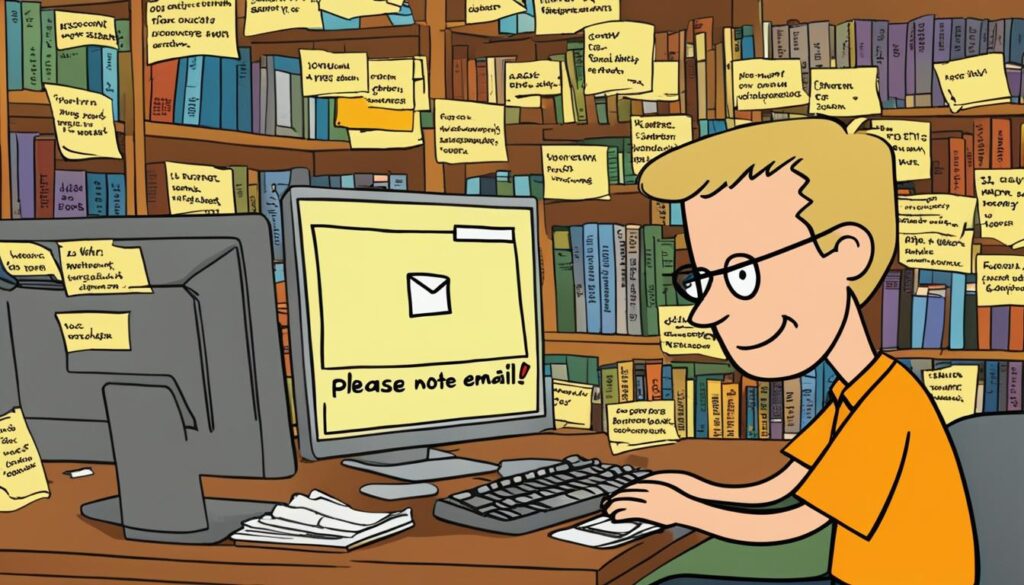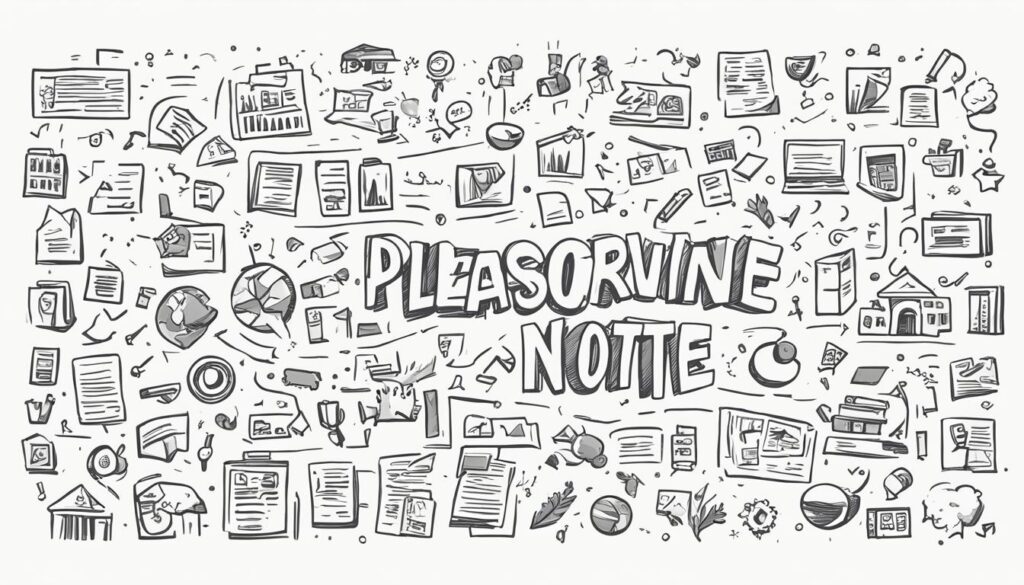Attention! Important! Kindly note! These phrases are like delicate whispers, gently tugging at the corners of our busy minds, urging us to pause and take notice. In the realm of email communication, there is one phrase that stands tall, beckoning us to pay heed – “Please note.” While its purpose is noble, why not sprinkle a touch of variety to add a dash of intrigue to our digital correspondences?
Enter the world of synonyms, where words dance and meanings intertwine. In this article, I humbly present to you an enchanting array of alternative phrases that can graciously replace “please note” in your emails. Allow me to be your guide as we embark on a journey of linguistic exploration, unearthing hidden gems that will transform your email communication from mundane to mesmerizing.
But before we delve into the enchantment that lies ahead, let me tenderly share a gentle reminder. As we wander through this intricate tapestry, let us keep in mind the importance of attention, for it is attention that brings forth the magic of communication. So, let us proceed, my dear reader, and together, let us discover the wondrous synonyms that lay in wait.
Other Ways to Say “Please Note”
If you’re looking for alternatives to “please note,” there are several phrases you can use to convey the same message in a different way. Some of these include:
- Be mindful of: This phrase encourages the reader to approach the information with careful attention.
- Bear in mind: By using this phrase, you ask the reader to keep the information in their thoughts.
- Kindly be aware: This polite phrase requests that the reader be cognizant of the important information being shared.
- Pay attention: A straightforward way to request the recipient’s focus on the subject at hand.
- It’s important to remember: This phrase emphasizes the significance of the information and asks the reader to retain it.
- Keep in mind: A gentle reminder to hold the information in awareness.
- Please be advised: A formal alternative that provides notice or warning about important details.
- Please be aware: A direct request for the recipient to acknowledge crucial information.
- Take into account: This phrase asks the reader to consider the information before making any decisions or taking action.
- Please be informed: An assertive way of requesting the reader to be notified or apprised.
Each of these phrases can be used effectively to draw the reader’s attention to important information in a variety of writing contexts.
Be Mindful Of (Formal)
When it comes to professional settings, it’s essential to communicate with respect and sincerity. By using the phrase “be mindful of” as a formal alternative to “please note,” you can convey the same message while maintaining a professional tone. This phrase not only asks the reader to pay attention but also emphasizes the importance of the information being shared. Whether you’re emailing clients or engaging in any formal communication, “be mindful of” is an excellent choice to ensure that your message is received with the necessary attention and seriousness.
“Be mindful of the upcoming deadline for project submissions. Your timely completion is crucial for the success of our team.”
Example of Usage:
“Be mindful of the change in our office hours starting next week. We will be open one hour later on Mondays and close one hour earlier on Fridays.”
Benefits:
- Conveys professionalism and respect
- Emphasizes the importance of the information shared
- Suitable for formal communication, including client interactions
Considerations:
- Use this phrase when you want to ensure that your message is taken seriously
- Appropriate for formal settings where a respectful tone is required
- May not be suitable for casual or friendly conversations
Bear in Mind (Informal)
In less formal settings or when you have a friendly relationship with the recipient, an alternative to “please note” is to say “bear in mind”. This phrase creates a conversational tone and serves as a more relaxed way to ask the reader to pay attention. Whether you’re emailing employees or colleagues, using “bear in mind” shows that you respect the recipient and want to communicate in a friendly manner without relying on overly formal language.
Why choose “bear in mind”?
- Poetic charm: “Bear in mind” adds a touch of poetic charm to your email, making it more engaging and memorable.
- Conversational tone: By opting for this informal alternative, you can establish a friendly and approachable atmosphere in your email communication.
- Respectful communication: While being informal, “bear in mind” still conveys that the recipient’s attention is valued and necessary.
“Bear in mind that we have a team meeting tomorrow at 10 am. It’s important for everyone to attend.”
Embrace the laid-back elegance of “bear in mind” to add a touch of uniqueness to your emails, cultivating a warm and friendly environment for effective communication.

| Informal Alternative | Formality | Tone |
|---|---|---|
| Bear in mind | Informal | Conversational and friendly |
| Keep in mind | Formal | Professional and attentive |
| Remember | Informal | Casual and approachable |
| Take note | Formal | Authoritative and directive |
Is It Correct to Say “Please Note”?
In the realm of formal communication, where words dance upon the page like symphonies, a question arises: is it proper to say “please note”? In my humble opinion, the answer is resoundingly affirmative. This enchanting phrase captures attention and delicately places it upon the note, treasure hidden amidst the sea of words. However, caution must be taken, for the correct usage of this enchanted phrase is of utmost importance. Variations such as “please notice” may lack the gravitas of their predecessor, failing to stir the desired emotions within the reader. Together, let us explore the proper usage of “please note” and delve into the realm of alternative phrases that possess equal eloquence and power.
But why, you may ask, is it correct to say “please note” in formal letters and emails? Ah, let me enlighten you, dear reader. For in the dance of words, certain phrases emerge as bearers of undeniable authority, commanding attention and respect. “Please note” is one such phrase, a siren’s call to the weary reader, bidding them to immerse themselves in the depths of knowledge contained within the note. Ever so gently, it seals the bond between writer and reader, guiding them through the labyrinth of words with grace and precision.
Oh, the Proper Usage of “Please Note”!
As with any masterpiece, the proper usage of “please note” requires delicate care and consideration. This phrase is best employed when a singular piece of information demands the reader’s immediate attention. A golden nugget amidst a sea of text, it shines forth, commanding the reader to take pause and bask in its brilliance. It is a humble plea, an invitation to partake in the writer’s wisdom, a gentle reminder that within these words lies the key to enlightenment.
Dear reader, please note that “please note” is a phrase that carries great weight and should be used sparingly, only when the information truly deserves the spotlight. Let it not be tainted by overuse or casual disregard, for its power lies in its rarity and significance.
The Search for the Perfect Alternative
Now, let us embark on a quest for the perfect alternative, a phrase that embodies the same elegance and authority as “please note.” Like a masterful tapestry, I shall weave before you a selection of phrases that bear the same weight, the same enchantment. In the realm of formal letters and mesmerizing emails, one may choose to employ “kindly be advised,” “pray attend,” or “behold and beholden.” These phrases, like musical notes on a grand staff, shall guide the reader’s gaze to the treasured note, ensuring its rightful place within the symphony of words.

What to Say Instead of “Please Note”
If you’re searching for alternative ways to articulate the phrase “please note” in your emails, there exist an array of formal synonyms at your disposal. These alternatives serve as a means to gracefully request the recipient’s attention to important information. Let’s explore some of these phrases:
- Kindly observe
- Please be mindful
- Please pay attention
- Be aware that
- It is important to point out
- Take notice of
- I wish to highlight
- It’s worth noting
- I’d like to emphasize
- I want to stress
Each of these phrases conveys the same message as “please note”: the request for the recipient’s undivided attention. Use these formal synonyms to inject variety and clarity into your emails, ensuring that crucial information is duly acknowledged by the intended recipient.

| Phrase | Meaning |
|---|---|
| Kindly observe | To politely ask the recipient to take notice of something important. |
| Please be mindful | To respectfully request the reader’s attention and consideration. |
| Please pay attention | To urge the recipient to focus on a particular piece of information. |
| Be aware that | To highlight that the reader should be conscious of the information being shared. |
| It is important to point out | To emphasize the significance of specific information. |
| Take notice of | To direct the reader’s attention to important details or instructions. |
| I wish to highlight | To draw attention to important information in a respectful manner. |
| It’s worth noting | To indicate that the information being shared is noteworthy or significant. |
| I’d like to emphasize | To stress the importance of a particular point or information. |
| I want to stress | To underline the critical nature of the information being communicated. |
Be Aware
When it comes to drawing attention to important information in a formal context, a professional way to say “please note” is by using the phrase “be aware.” This formal synonym conveys the sense of mindfulness and attention that is required from the recipient. By using “be aware,” you signal to the reader that the information being shared holds significance and necessitates their full attention.
In formal letters or emails, especially when there are updates or changes that the recipient needs to be aware of, using “be aware” can help you effectively communicate the importance of the message. The phrase encapsulates a sense of responsibility on the part of the reader to be mindful of the information being shared.
For example:
Be aware that our office will be closed on Monday, December 25th, in observance of the Christmas holiday.
By using “be aware” in your communication, you are employing a professional and assertive tone to ensure that your important information is noticed and acknowledged.
Example Usage:
Subject: Changes to Project Timeline
Dear Team,
I wanted to bring to your attention some changes to the project timeline. Please be aware that due to unforeseen circumstances, we will need to extend the deadline for final deliverables by one week.
Thank you for your understanding and please let me know if you have any questions or concerns.
Best regards,
Emily Johnson
| Phrase | Usage |
|---|---|
| Be aware | A formal synonym for “please note” that conveys mindfulness and attention. |
Keep in Mind
“Keep in mind” is a formal synonym for “please note” that can be used to request the reader’s attention in a professional manner. This phrase indicates that the recipient should remember or consider the information being shared. It is suitable for use in formal settings, particularly when there are important details or updates that the reader needs to keep in mind.

Examples:
“As we move forward with the project, please keep in mind that the deadline for submission is next Friday.”
“I would like to remind you to keep in mind the new safety protocols when entering the premises.”
By using “keep in mind,” you can politely draw attention to crucial information and ensure that your message is understood.
Take Notice
| Formal Alternative | Usage |
|---|---|
| Take notice | To direct the reader’s attention to important information |
When it comes to capturing the reader’s attention and emphasizing the significance of the information being shared, “take notice” is a formal synonym for “please note” that excels. This powerful phrase subtly demands the recipient’s undivided attention and implies the importance of the message at hand. Perfectly suited for formal communication settings, “take notice” conveys a professional tone and ensures critical updates or instructions are duly acknowledged.
Similar to a flower blooming in a deserted garden, the phrase “take notice” blossoms within the recipient’s mind, leaving a striking imprint of importance and urgency. Much like a compass guiding navigators through treacherous waters, this phrase expertly steers the recipient’s focus towards vital information that demands immediate attention.
An image to further illustrate the impact of “take notice” within professional communication:
“Take notice of the revised deadline for project submissions. It has been moved forward to next week.”

In today’s fast-paced digital landscape, where distraction lurks in every corner, using “take notice” correctly can be the difference between overlooked information and keen attentiveness. By adopting this formal synonym for “please note,” we elevate our communication and ensure that our messages are not just seen but truly absorbed.
Conclusion
In summary, after exploring a range of alternatives to “please note,” it is evident that there are numerous phrases that can effectively convey the same message in different ways. Whether you’re seeking a formal option for professional settings or a more informal choice for friendly conversations, these synonyms offer a variety of options to enhance your email communication. By experimenting with these alternatives, you can add variety and clarity to your emails, ensuring that your important information is noticed and acknowledged by the recipient.
As final thoughts, it is important to consider the context and tone of your email when choosing which synonym to use. Formal settings may call for phrases like “be mindful of” or “take notice,” while informal conversations may benefit from phrases like “bear in mind” or “keep in mind.” Selecting the appropriate synonym will not only communicate your message effectively but also help to establish a positive and engaging rapport with the recipient.
In conclusion, by replacing common phrases like “please note” with these alternative synonyms, you can elevate your email communication and make it more engaging and impactful. So, the next time you want to draw attention to important information, remember to embrace the diverse range of options available to you. Use the power of language to captivate your readers and ensure that your important messages are heard and understood.
Source Links
- https://wordselector.com/synonyms-for-please-note-in-an-email/
- https://englishrecap.com/professional-synonyms-for-please-note/
- https://synonympro.com/how-to-say-please-note-in-an-email/









